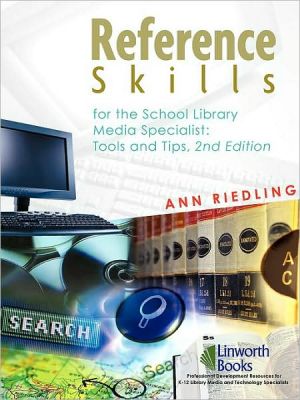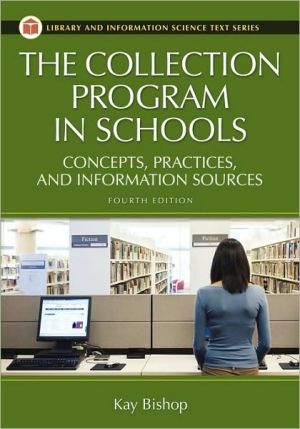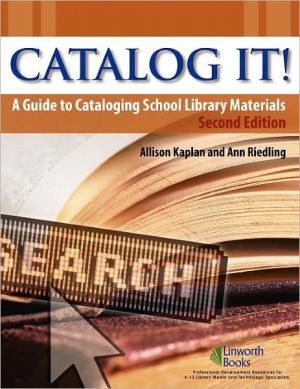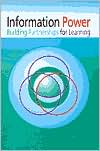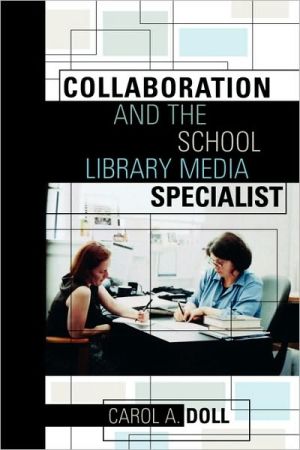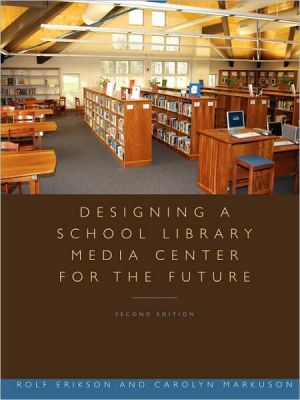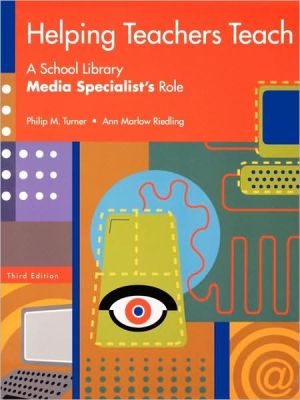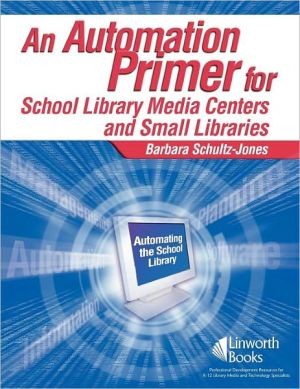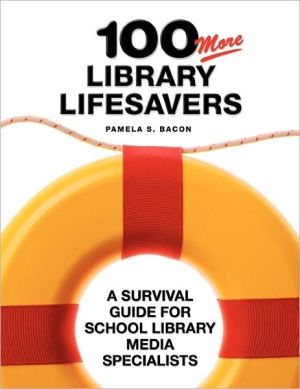Reference Skills For The School Library Media Specialist
This updated edition is tailored specifically for the school library media specialist, focusing on reference processes, sources, services, and skills. It also offers useable, real-life examples—ones media specialists can refer to when particular reference situations arise in school library media centers. This new edition contains updated terminology and techniques, research processes and models, selection, evaluation, maintenance of reference sources, and addresses the vast changes in...
Search in google:
In this update of the 2000 text designed for courses preparing students for a degree in school library media, Riedling adds Webliographies and updated information on publishers and Web tools. Regarding such specialists as key players in promoting information literacy, she emphasizes communication in linking students' information needs with relevant print and electronic reference sources. The guide includes realistic scenario-based exercises and a glossary. No details are provided on the author's background. Annotation ©2005 Book News, Inc., Portland, OR School Library Journal For this new edition, Riedling has updated the technology discussions, relevant Web sites, and online resources within the appropriate chapters rather than appending a separate chapter. The other major change is the final chapter, which contains both an exercise as well as a separate reference scenario for elementary school, middle school, and high school. The author discusses a wide range of standard reference tools. Information is boxed and bulleted for quick reference. Annotated and complete lists of print and online resources are included. The up-to-date Webliographies included at the end of each chapter will be of great assistance to students and beginning librarians. This is a helpful tool for those new to the profession. A good complement to the more general texts on librarianship that are often used.-Lori Matthews, Loyola School, New York City Copyright 2005 Reed Business Information.
Acknowledgments viiDedication viiIntroduction ixWhat Is Reference All About? 1Reference and the School Library: An Overview 3Introduction 3Reference Services 3The Reference Process 5Reference and Information Literacy 6Research Problem-Solving Processes and Models 8Reference and the Technology Connection 12Conclusion 12Useful Web Sites 13Selection, Evaluation, and Maintenance of the Reference Collection 15Introduction 15What Do You Need? - The Selection Process 16How Do You Know If It's Good? - The Evaluation Process 19Collection Organization and Maintenance 21Conclusion 22Nuts and Bolts 23Bibliographies 25Introduction 25Evaluation and Selection 28Basic Sources 29Webliography 31Directories, Almanacs, Yearbooks, and Handbooks 33Introduction 33Evaluation and Selection 35BasicSources 37Directories 37Almanacs 38Yearbooks 39Handbooks 40More Examples of Online Directories, Almanacs, Yearbooks, and Handbooks 41Webliography 43Biographical Sources 47Introduction 47Types of Biographical Sources 47Evaluation and Selection 48Basic Sources 50Who's Who 50Current Biographical Dictionaries 51Author Sources and Literary Criticism 52Retrospective Biographical Dictionaries 53Conclusion 54Webliography and Additional Examples of Online Biographical Resources 54Dictionaries and Encyclopedias 57Dictionaries 57Introduction 57Evaluation and Selection 58Basic Sources 60English Language Dictionaries 60Foreign Language Dictionaries 61Historical Dictionaries 61Slang and Dialect Dictionaries 62Thesauri 62Specialty Dictionaries 63Webliography 64Geographical Sources 67Introduction 67Evaluation and Selection 68Basic Sources 70Current World Atlases 70Historical Atlases 71Thematic Atlases 71Maps 72Gazetteers and Other Geographical Sources 72Additional Online Geographical Resources 73Gazetteers 74Atlases and Maps 75Webliography 76Indexes and Abstracts; Online Periodical Databases 79Introduction 79Evaluation and Selection 80Basic Sources 82Online Periodical Indexes 82Specialized Indexes 84Webliography 86The Art of Questioning 89The Reference Interview 91Introduction 91The Patron - The Student 92The Setting 93You - The School Library Media Specialist 94Questions and Questioning 95Types of Reference Interviews 96Conclusion 97Reference and the Web 99The Web in Today's Reference Services 101Introduction 101The Web and Reference Services in School Library Media Centers 103Useful Web sites 105Scenarios and Exercises for School Library Media Specialists 107Introduction 108Special Notes to Instructors 109Scenarios and Exercises 111Elementary School 111Middle School 113High School 115Publisher Information 117Glossary 125Works Cited 129Index 131
\ From the Publisher"Each type of library—school, public, academic, etc.—has its own unique needs, including how they tackle reference questions and collections. This unique perspective is often lost in professional materials on general reference services for patrons. However, Ann Riedling has taken that uniqueness and made it the focus of this work. The book is divided into five major parts—definition of reference, a review of major reference materials, the art of the reference interview, reference on the Web, and scenarios and examples. In explaining the major reference materials, the author has provided a rationale for materials to be included, guidance for examples of those materials at all levels, and a scope for selecting these materials for purchase. The major addition to this second edition has been online databases and Internet resources. While the author focuses an entire chapter on the Web, she also has infused into the other chapters a 'Webliography' of online resources for each major reference area. Instructors of school library reference and collection development courses will find this edition to be a good choice for a textbook. Beginning school library media specialists especially will find this book helpful; however, even those with several years in the field may appreciate the Web resources and the suggested titles to consider. Recommended."\ -\ Library Media Connection\ \ \ \ \ \ School Library JournalFor this new edition, Riedling has updated the technology discussions, relevant Web sites, and online resources within the appropriate chapters rather than appending a separate chapter. The other major change is the final chapter, which contains both an exercise as well as a separate reference scenario for elementary school, middle school, and high school. The author discusses a wide range of standard reference tools. Information is boxed and bulleted for quick reference. Annotated and complete lists of print and online resources are included. The up-to-date Webliographies included at the end of each chapter will be of great assistance to students and beginning librarians. This is a helpful tool for those new to the profession. A good complement to the more general texts on librarianship that are often used.-Lori Matthews, Loyola School, New York City Copyright 2005 Reed Business Information.\ \
